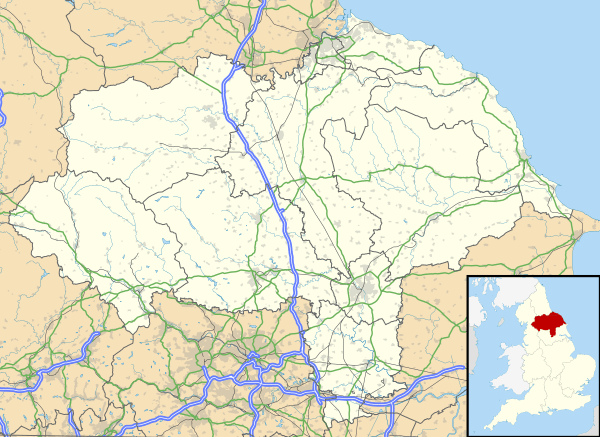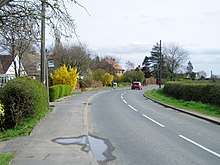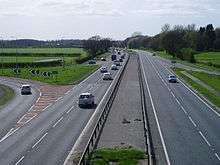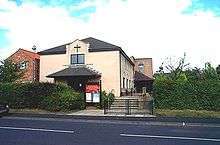Copmanthorpe
Copmanthorpe (/ˈkɒpmənˌθɔːrp/) is a village and civil parish in the City of York in the English county of North Yorkshire, 4 miles (6.4 km) south-west of York, west of Bishopthorpe and close to Acaster Malbis, Askham Bryan and Askham Richard. According to the 2001 census the parish had a population of 4,262,[2] reducing to 4,173 at the 2011 Census.[1] Until 1996 it had been part of the Selby district. Historically part of the West Riding of Yorkshire, the village is part of the York Outer constituency.[3]
| Copmanthorpe | |
|---|---|
.jpg) Copmanthorpe Shops | |
 Copmanthorpe Location within North Yorkshire | |
| Population | 4,173 (2011 census)[1] |
| OS grid reference | SE5747 |
| Civil parish |
|
| Unitary authority | |
| Ceremonial county | |
| Region | |
| Country | England |
| Sovereign state | United Kingdom |
| Post town | YORK |
| Postcode district | YO23 |
| Dialling code | 01904 |
| Police | North Yorkshire |
| Fire | North Yorkshire |
| Ambulance | Yorkshire |
| UK Parliament | |
The village is mentioned in the Domesday Book as Copemantorp, from Old Norse Kaupmanna þorp,[4] meaning Traders' Village or Craftsmen's Village.[5] The area of Copmanthorpe covering Main Street, Church Street and Low Green became a Conservation Area in 1978.[6]
Copmanthorpe is bounded to the north by the A64, while the East Coast Main Line runs through its south-east periphery, to the west lies open countryside.
History

The Roman road from York (Eboracum) to Tadcaster (Calcaria) runs to the north of the village centre, along what are now Top Lane, Hallcroft Lane and Colton Lane.
It is recorded that the Lord of Copmanthorpe Manor was an Anglo-Saxon, named Gospatrick, at the time of the Norman invasion of England. According to the Domesday Book, the title was handed to Erneis de Burun in 1084, when he became Sheriff of Yorkshire.
Members of the Vavasour family were resident in the village from the 17th until the 20th century. A William Vavasour of Copmanthorpe is recorded in the Battle Abbey Roll. The Vavasour family were the holders of the Barotnetcy of Haselwood near Tadcaster from 1628, which included estates in Killingthorpe, Spalington and Copmanthorpe.[7] Sir William Vavasour was the first and only Baronet of Copmanthorpe in 1643 until his death in 1659 and was the son of the Knight Marshall, Sir Thomas Vavasour.[8] In 1672 the manor was sold to the Wood family.
Copmanthorpe was the site of a preceptory of the Knights Templar, on land given to the Templar Knights by the Malbis family (see Acaster Malbis). A Preceptor, Robert de Reygate, of the Temple is recorded as early as 1291.
During the First World War, there was a Royal Flying Corps airfield near to Drome Road.[6][9] In 1919, one of the huts from the aerodrome was bought by Yearsley Bridge Hospital (a fever hospital), in the north of York, to provide additional nurses's accommodation.[10]
A railway accident occurred on 25 September 2006, when the 14:25 Plymouth to Edinburgh Virgin Cross Country service collided with a car that had veered off Moor Lane and onto the tracks, killing the car driver and causing the front carriage of the Voyager train set to derail. The accident happened at approximately 21:01 BST. The train involved was already running late on its journey towards York.
Governance
Originally, the village was part of the Rural West Ward of the Unitary Authority of the City of York. As of 2019 it is a one councillor ward, it is currently represented on the City Council by Councillor David Carr who is a former member of the local Conservative Party and now an Independent.[11]
Geography
Copmanthorpe lies 4 miles south-west of York city centre. The village lies on glacial moraine of sandstone overlain with boulder clay. The highest point of the village is on Top Lane at 81 feet above sea level.[6] The village has two greens, Low Green and the smaller Memorial Green.
Demography
The population of the village has almost trebled over the past hundred years since the first census in 1881, rising from 311 in 1881 to 1,027 in 1961.[12] In the 2001 census the village parish notes the population as 4,262. The largest Age Group within the population, 30.5% between 45 and 64 years old with 26.1% were between 30 and 44 years old. Of the population aged between 16 and 74 years old, 69.3% declared they were in some form of employment and 25.3% said they were retired. Of the 1,699 households, 35% were Semi-Detached or terraced and 64.3% were Detached. The level of household ownership was 91%.[13]
Economy
_002.jpg)
.jpg)
Originally the village was a place for tradesmen and farming, but currently Copmanthorpe is a functional commuter village, with two churches, a post office, a butcher's, a library, two coffee shops, two hair dresser's, a barber's, a pharmacy, two small food shops, one pub and several takeaways.[14]
Culture and community
Copmanthorpe Recreation Centre ("the Rec") provides most of the sporting and many of the social facilities in the village. It is a registered charity for the benefit of the whole village. There is also a children's play area with a variety of equipment on a safety surface.[15] Allotments, with fifty four plots, can be found on Temple Lane and are run by Copmanthorpe Parish Council.[16]
There are numerous village functions throughout the year, including the Carnival in summer and the Fayre in spring. The local branch of the Women's Institute was formed in 1924 and moved into a purpose built hall in 1928.[6] Other clubs and societies include a Mothers' Union, drama group, youth club and both Scouts and Girl Guide troops.
In 2014 the first Charity Beerfest was held at St Giles Church in Copmanthorpe. All profits go directly to local charities and voluntary groups. 'Coptoberfest' raises around £4,000 every year.
Transport

The village is bypassed by the A64 Leeds to Scarborough road. This road used to pass through the village along the route of the old Roman road along Hallcroft Lane and Top Lane. The bypass was built in 1975–76[17] with the grade separated junction linking Manor Heath to Askham Fields Lane and the A1237 York Outer Ring Road being built in 1987.[18] The traffic lights at the end of Top Lane that used to provide access to the bypass for village residents were removed in 2002.[17]
There was a railway station in the village that opened in 1839 on the York & North Midland line. The station was closed to passengers in 1959 and closed altogether in 1964.[6] Plans have been put forward to reopen the station along with others in the area surrounding York, but these have failed to materialise.[19]
The village is served by one regular local bus service from York, run by Connexions, Yorkshire Coastliner service, and by a service run by Harrogate Coach Travel as part of the York to Colton route.
Education
The original village school opened in 1869 on the site now occupied by the health centre.[6] The current junior school, opened in 1968, was designed to take over from the Victorian building, but as the population grew an infants school was also built alongside in 1972.
Primary education is currently catered for at Copmanthorpe Primary School[20] with students usually going to Tadcaster Grammar School, a co-educational comprehensive school, for their secondary and further education.
Religion

St Giles' Church on Church Street was built in 1180 and much remains of the original Norman design.[6] St Giles did not become a parish church in its own right until 1866, as Copmanthorpe was previously part of the parish of St Mary Bishophill Junior in York. The parish was detached from St Mary Bishophill in 1844 and for a time linked to the parish at Askham Richard.[21] Church Street was also the site of the first Methodist Chapel in the village, around 1788. The modern chapel was built in 1958 in Main Street by the architects Greenwood and Nicholls.
Sports
There is a dedicated sports area at the Recreation Ground which is the home of Copmanthorpe Football Club and Copmanthorpe Cricket Club. Tennis and bowls are also played at the ground. The football club was founded in 1962 and, as of 2010, the 1st XI play in the Premier Division of the York Football League and the reserves in the Reserve A Division.[22] As of 2010, the cricket club 1st XI play in Division 1 of the York Vale Cricket League with the 2nd X I playing in Division 4.[23]
References
- UK Census (2011). "Local Area Report – Copmanthorpe Parish (1170211383)". Nomis. Office for National Statistics. Retrieved 11 February 2019.
- UK Census (2001). "Local Area Report – Copmanthorpe Parish (1543504419)". Nomis. Office for National Statistics. Retrieved 11 February 2019.
- "Parliamentary Constituencies". City of York Council. Archived from the original on 5 June 2011. Retrieved 30 May 2011.
- Moorman, Frederic William (1910). The place-names of the West Riding of Yorkshire, Issue 18 of Publications of the Thoresby Society, Leeds Thoresby Society (Eng). Johnson Reprint Corp. p. xxxi.
- Mills, A.D. (1991). Oxford Dictionary of British Place Names. Oxford: Oxford University Press. ISBN 0-19-852758-6.
- "The Copmanthorpe Story" (PDF). Copmanthorpe Parish Council. Retrieved 30 May 2011.
- Powlett, Catherine Lucy Wilhelmina (1889). The Battle Abbey Roll:With Some Account of the Norman Lineages, Volume 3. J.Murray. p. 522.
- Bean, William Wardell (1890). The parliamentary representation of the six northern counties of England: Cumberland, County Durham, Lancashire, Northumberland, Westmorland and Yorkshire, and their cities and boroughs. 1603–1886. With lists of members and biographical notices. p. 789.
- Benson, George (1911). York. Cooper & Swann. p. 157.
- Webb, K.A. (2002). County Hospital to NHS Trust: The History and Archives of NHS hospitals, services and management in York, 1740–2000. University of York. p. 143. ISBN 0-903857-99-5.
- "Find Councillor: Results by Ward: Rural West York Ward". City of York Council. Retrieved 10 August 2019.
- "Historical Statistics: Population: Copmanthorpe Civil Parish". A Vision of Britain Through Time. University of Portsmouth. Retrieved 30 May 2011.
- UK Census (2011). "Local Area Report – Copmanthorpe Parish (1170211383)". Nomis. Office for National Statistics. Retrieved 11 March 2018.
- "Shopping". Copmanthorpe: The Parish Council Website. Copmanthorpe Parish Council. Retrieved 30 May 2011.
- "Play Areas". City of York Council. Archived from the original on 14 March 2012. Retrieved 30 May 2011.
- "Other Allotments in York". City of York Council. Archived from the original on 3 January 2011. Retrieved 30 May 2011.
- "York Bypass". Retrieved 9 June 2012.
- The Stationery Office (1987). A64 Leeds – York – Scarborough Trunk Road (Copmanthorpe Grade Separated Junction) (Trunking) Order 1987: Highways, England and Wales. London: The Stationery Office. ISBN 978-0-11-078274-4.
- "York Suburb Station Plan Derailed Again". The Press. Newsquest Media Group. Retrieved 30 May 2011.
- "Copmanthorpe Primary School". Copmanthorpe Primary School. Archived from the original on 10 September 2012. Retrieved 30 May 2011.
- Royle, Edward (1983). The Victorian Church in York. York: Borthwick Papers. pp. 2 & 42. ISBN 0-900701-57-9.
- "Copmanthorpe: Football Club". Copmanthorpe Football Club. Retrieved 30 May 2011.
- "Copmanthorpe Cricket Club". Copmanthorpe Cricket Club. Archived from the original on 24 March 2012. Retrieved 30 May 2011.
External links
![]()